Items
topic_interest is exactly
experience
-
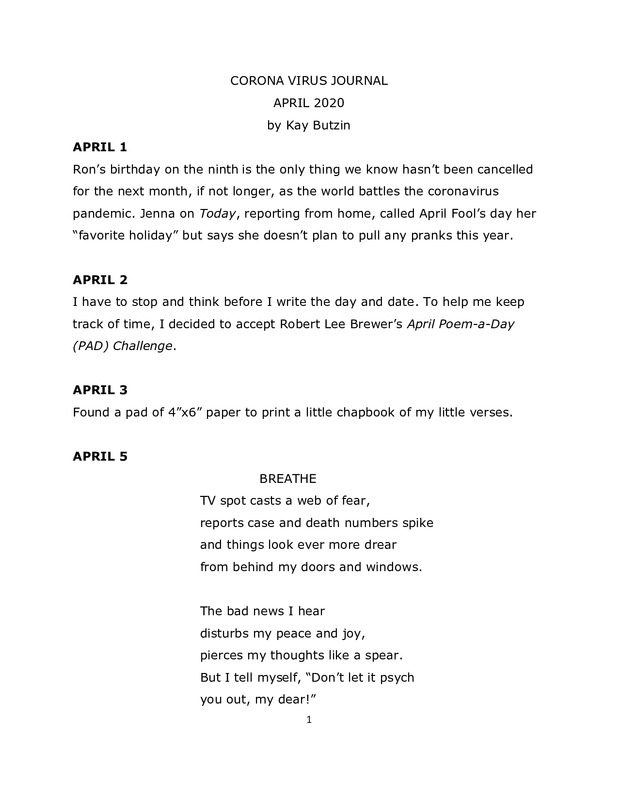 2020-04-01
2020-04-01Coronavirus Journal: April 2020
The essay is composed of entries from my daily journal during the month of April 2020, at the beginning of the pandemic quarantine. It shares the perspective of my partner and me, retired senior citizens in Up North Michigan. -
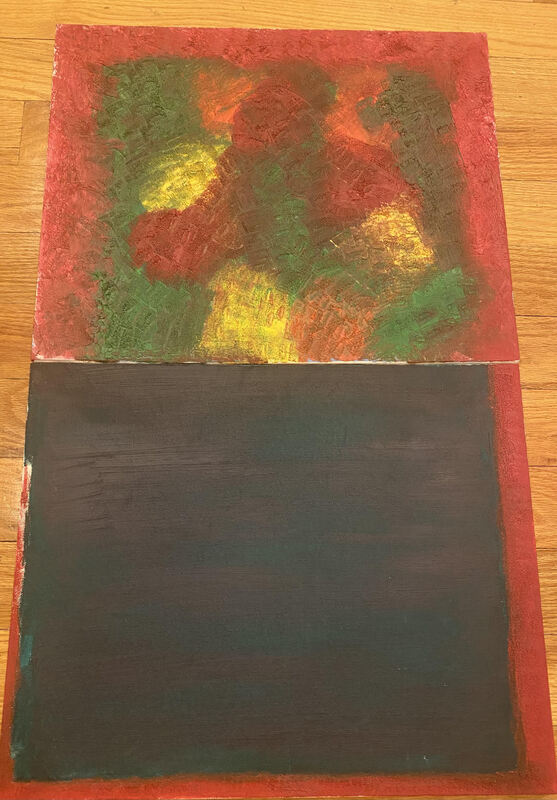 2022-03
2022-03Yesteryear
Yesteryear is the product of pent up anxiety, confusion, loss, depression and hopelessness, painted in 2022. It is how I would describe life before and after Covid-19. Separated into two pieces the anterior canvas is multicolored, to represent the carefree state of life. It can represents the high points in my life pre-pandemic, inclusive of freedom and family. The oil protrudes in some parts and is flat in others signifying the highs and lows of everyday life. The posterior canvas is quite the opposite if viewed closely, some of the colors used in the painting above have been covered in dark colors. It is smooth to the touch. No high points in this instance. All lows. Dreary. Dark. The red bordering both , represents the vitality of human nature. At the top it was uncontrolled, bleeding into all other aspects of life pre-Covid. As it travels south, it becomes thinner, more rigid, more linear. It then starts to completely disappear and despair has taken its place. -
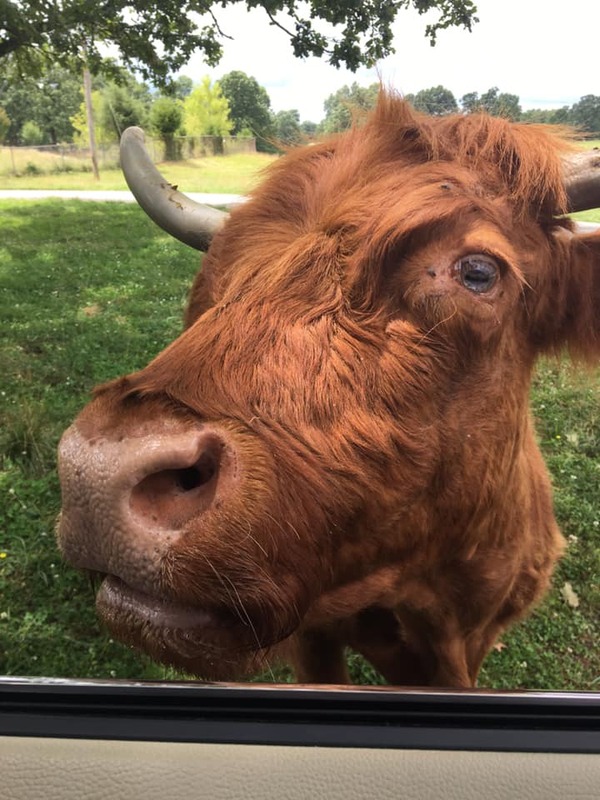 2021-07-11
2021-07-11Wild Ride at the Safari Park
Over the past few years, the COVID pandemic has become a pretty lonely time for me living in Missouri, where I am originally from. I moved out to Arizona over five years ago and have not left. When the pandemic hit, my job moved to be online for a while, and therefore I made the trip to go back home and be with my family. We realized that we became increasingly stir-crazy through the pandemic by staying in the house all of the time. There was no more travel to the restaurants, shopping, and entertainment places. The past summer, with the pandemic on a decline, my family and extended members traveled to the Wild Animal Safari park. There was my Aunt Pat, my Niece, Morgan, my mother Robyn, and myself in the car as we traveled an hour away to enjoy the safari animals. The great thing about the excursion is that we did not have to get out of the car to remain safe during the pandemic. We received our animal food at the entrance and then proceeded through the park. It was one of the best times of the year because I am not sure I have laughed so hard in my life. I had no idea animals had that long tongues that they would stick in the car windows to get the food pellets. It was delightful seeing my niece squirm around in the car as she tried to get away from the animals. It was one of the best times during the pandemic, and I cannot recommend this excursion or something similar. -
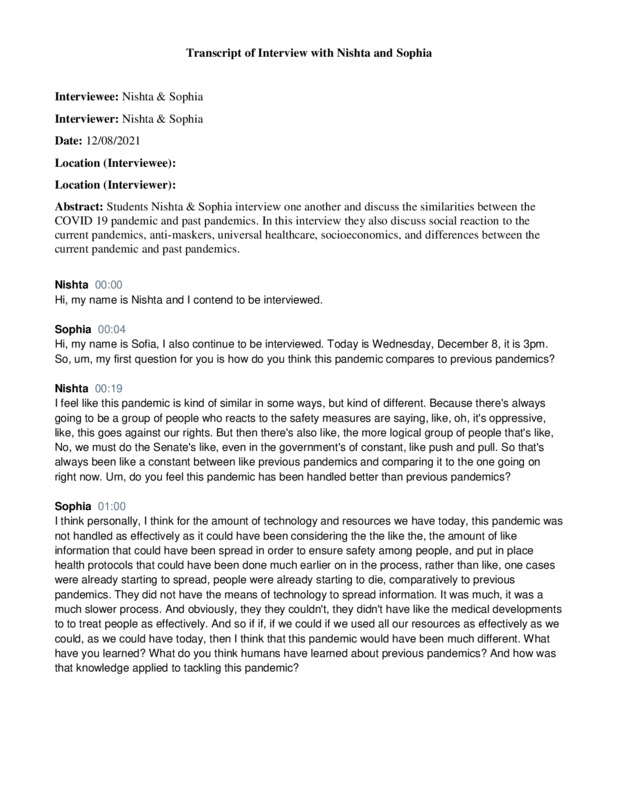 2021-12-08
2021-12-08End of Semester Covid-19 Interview Oral History 2021/12/08
This interview is about our thoughts and understandings of the Covid-19 pandemic after having taken a semester-long course about the history of pandemics spanning from the black plague until the Spanish flu. We've discussed how we think the world could have handled this pandemic differently, the similarities and differences between this pandemic and previous pandemics, and how this pandemic affected our personal lives. -
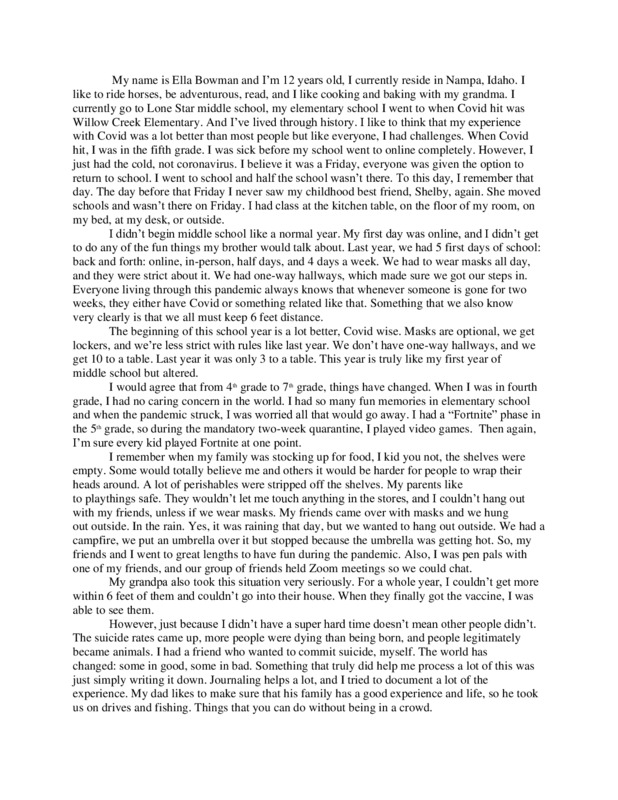 2021-10-08
2021-10-08My Pandemic Life
My name is Ella Bowman and I’m 12 years old, I currently reside in Nampa, Idaho. I like to ride horses, be adventurous, read, and I like cooking and baking with my grandma. I currently go to Lone Star middle school, my elementary school I went to when Covid hit was Willow Creek Elementary. And I’ve lived through history. I like to think that my experience with Covid was a lot better than most people but like everyone, I had challenges. When Covid hit, I was in the fifth grade. I was sick before my school went to online completely. However, I just had the cold, not coronavirus. I believe it was a Friday, everyone was given the option to return to school. I went to school and half the school wasn’t there. To this day, I remember that day. The day before that Friday I never saw my childhood best friend, Shelby, again. She moved schools and wasn’t there on Friday. I had class at the kitchen table, on the floor of my room, on my bed, at my desk, or outside. I didn’t begin middle school like a normal year. My first day was online, and I didn’t get to do any of the fun things my brother would talk about. Last year, we had 5 first days of school: back and forth: online, in-person, half days, and 4 days a week. We had to wear masks all day, and they were strict about it. We had one-way hallways, which made sure we got our steps in. Everyone living through this pandemic always knows that whenever someone is gone for two weeks, they either have Covid or something related like that. Something that we also know very clearly is that we all must keep 6 feet distance. The beginning of this school year is a lot better, Covid wise. Masks are optional, we get lockers, and we’re less strict with rules like last year. We don’t have one-way hallways, and we get 10 to a table. Last year it was only 3 to a table. This year is truly like my first year of middle school but altered. I would agree that from 4th grade to 7th grade, things have changed. When I was in fourth grade, I had no caring concern in the world. I had so many fun memories in elementary school and when the pandemic struck, I was worried all that would go away. I had a “Fortnite” phase in the 5th grade, so during the mandatory two-week quarantine, I played video games. Then again, I’m sure every kid played Fortnite at one point. I remember when my family was stocking up for food, I kid you not, the shelves were empty. Some would totally believe me and others it would be harder for people to wrap their heads around. A lot of perishables were stripped off the shelves. My parents like to playthings safe. They wouldn’t let me touch anything in the stores, and I couldn’t hang out with my friends, unless if we wear masks. My friends came over with masks and we hung out outside. In the rain. Yes, it was raining that day, but we wanted to hang out outside. We had a campfire, we put an umbrella over it but stopped because the umbrella was getting hot. So, my friends and I went to great lengths to have fun during the pandemic. Also, I was pen pals with one of my friends, and our group of friends held Zoom meetings so we could chat. My grandpa also took this situation very seriously. For a whole year, I couldn’t get more within 6 feet of them and couldn’t go into their house. When they finally got the vaccine, I was able to see them. However, just because I didn’t have a super hard time doesn’t mean other people didn’t. The suicide rates came up, more people were dying than being born, and people legitimately became animals. I had a friend who wanted to commit suicide, myself. The world has changed: some in good, some in bad. Something that truly did help me process a lot of this was just simply writing it down. Journaling helps a lot, and I tried to document a lot of the experience. My dad likes to make sure that his family has a good experience and life, so he took us on drives and fishing. Things that you can do without being in a crowd. I had it a lot better than most people, but I still had an experience with the pandemic. All in all, I’m glad I had this experience. I’m glad I lived through history and I’m glad that I have a story to tell. -
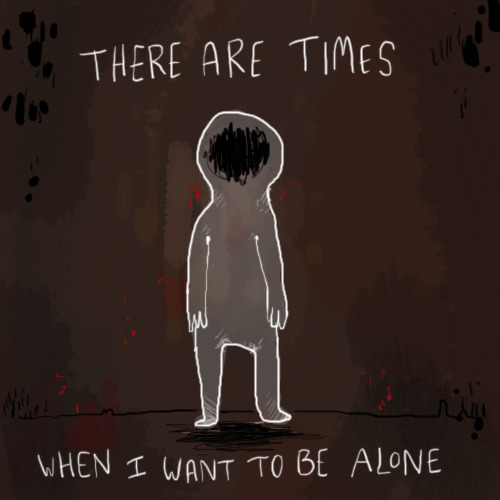 2021-06-13
2021-06-13COVID and My Mental State
I've never really felt like this before COVID, maybe at times but not as frequent. COVID has been a whole different experiences for me in many ways. I've never really felt so helpless even until now. Having nothing to do or being stuck at home, it took a toll on me. Many of the things I had a passion for or loved doing has made me lose motivation. I have been also slacking on my studies. COVID has also made me realized that I have no friends or personal relations outside of my family. Not going outside as also made me get terrible anxiety and talking to people has been difficult. But I have been working on it as of recently and working on myself little by little every day. -
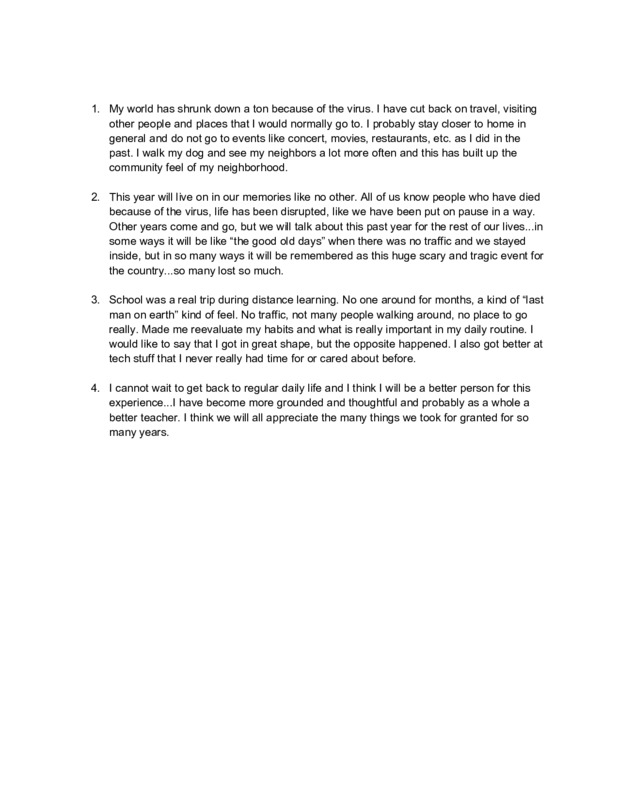 2021-05-18
2021-05-18COVID-19: A Year to Remember
This upload involving interviewing one of my highschool teachers a series of questions involving their experience during COVID-19 is intended to display how this pandemic has affected the lives of other people and how they have coped with the time spent adjusting to these new conditions. I myself find this aspect of learning from another person and their experience of these grand pandemic important as it allows others, myself included, to experience a different point of view towards a situation which ended up effecting nearly everyone across the globe in order to compare and contrast how others may have adapted to a new life style. -
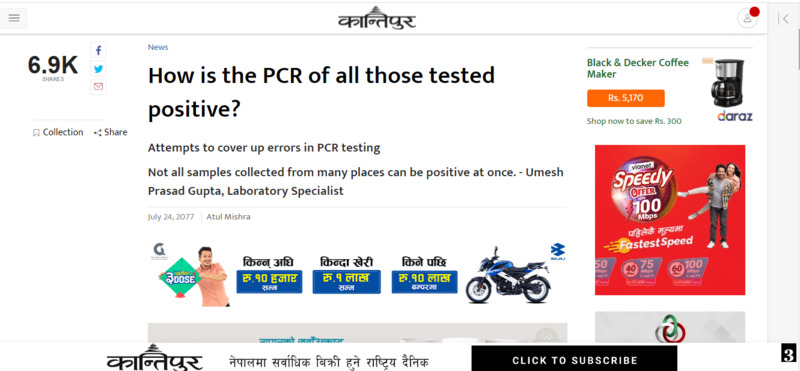 2020-06-29
2020-06-29The Unpredictable Horrors of Pandemic
The unpredictable horrors of pandemic “Corona Virus” the most lethal being on the earth that swept a mass population since its spread in December 2019. The Corona Virus had already started its attack and only a few cases had been reported in Wuhan, China until 2020, where it spread like a wildfire taking down millions of people. I belong to Nepal which is a neighboring country to China, so it surely was at higher risk which led to a countrywide lockdown in March 2020. It was then, people started to realize the seriousness of the situation. I would like to share my part of the pandemic experience in the first person “We” because I believe in this time I was with my family and we went through this experience- some bitter and some sweet but we were always together as a single unit. When the lockdown was imposed in Nepal, people were not aware of why it was being done. Why a mere viral disease was threatening nations? People took it as an excuse to vacation from work and school. We were told to stay inside the house, wear a mask and avoid gatherings by the national authorities. We could only go out for buying essentials (food, medicine) in the evening between 6-7 PM. Other times we were enjoying with our family because it is very rare to have this much free time in this busy life. We would cook new dishes, we also started gardening, growing vegetables in our backyard, and sometimes there was even “Movie Time” with the family. So, for the first few weeks, this lockdown was a perfect family time. Then the economy slowly started to tremble. People were left jobless, savings started to dry out. We were getting conscious and calculative on the grocery shopping. We own a garment factory (textiles and embroidery) so with no shops open during the time, we were also struggling with the money. My sister was currently stuck in Bangladesh because she had gone there for her educational studies and was stuck since both the countries were on lockdown. She finally arrived back home in June 2020 in an evacuation flight. She was then on self-isolation for 14 days. In these days of self-isolation, she showed no signs of COVID. Finally, on her last day of isolation, she went for a test and the horrors began. The reports came POSITIVE. This came as a shock to all of us because she had followed all the health protocols both in Bangladesh, during the flight, and after arriving in Nepal. We all were in disbelief and were taken aback. Unfortunately, the same day when the reports came out, there a news report regarding the lab where the reports were tested had cross-contamination, leading to inaccurate results in the hospital that day (the same day as my sister was tested). All of the samples were tested positive. Health authorities had to investigate that matter. But since she had no symptoms whatsoever, we wanted to re-check. Before we could even go to the other hospital, the members from the localities hurdled outside our house. They had been informed that an infected person was there in the area. My mom and dad went out to calm the crowd, trying to convince us that the results were doubtful and we were going for a re-check. The crowd was more like an angry mob and was dismissing all our claims, maybe also because this was the first case in our locality. They didn’t want to hear what we had to say. They forcefully started sealing the gates and the areas of our house, ordering all our neighbors to stay away from the area. They were told not to cross the gate and come in contact with us. Since the coronavirus is truly a big deal, though we had some doubts, we accepted that all our family members should go into isolation. But this was easier said than done. For those 14 days, we had no one around us to help. We couldn’t go out to get groceries or even other essentials. Our neighbors were threatened by the local authorities to not help us. They couldn’t send us the groceries or anything else. We were cast away from the whole society around that time. Luckily, we had an aunt living nearby. She used to leave us grocery items in our backdoors before the sunrise…. before anyone could even see. And we would run outside abiding by proper protocols, get those items and be back inside, panting, hoping no one saw us. At that time we had no money, limited food supply, and many mouths to feed. It was like we were living in an apocalyptic world. Baseless rumors had started to spread around the society stating we were seen partying and having gatherings a few days back. People would ring us up just to blame us as if we were the rotten ones. The most heartbreaking incident was when we were called by the local authority asking us to not come out on the balcony because according to them, somehow, we were exposing the virus in our area. Those 2 weeks became hell for our family. Finally, on the 14th day, all the members of our family members took a PCR test, and luckily, we were all tested negative. So in simple terms, we had recovered BUT society still didn’t accept us. Whenever we used to go to the shop, we were stared at and could hear whispers behind our back. People used to stay away from us and we were regarded (sort of) untouchables even after we had medical reports to prove them otherwise. Then a month later, even my maternal grandmother was infected with the virus. We could not go visit her as the hospital didn’t permit and she was under strict surveillance. She soon developed pneumonia as a complication of the COVID attack. Almost half of her lungs had been severely damaged and on 29th November 2020 she passed away. This pandemic left a great impact on us. We suffered great loss both emotionally and financially. From sneaking in groceries like smugglers to bidding goodbye to someone who loved us the most, it will always be an inerasable memory for us. Even as I write my experience, my words are not enough to emphasize the pain this pandemic has caused. But all I can say is we fought this as a FAMILY. One for All and All for One. -
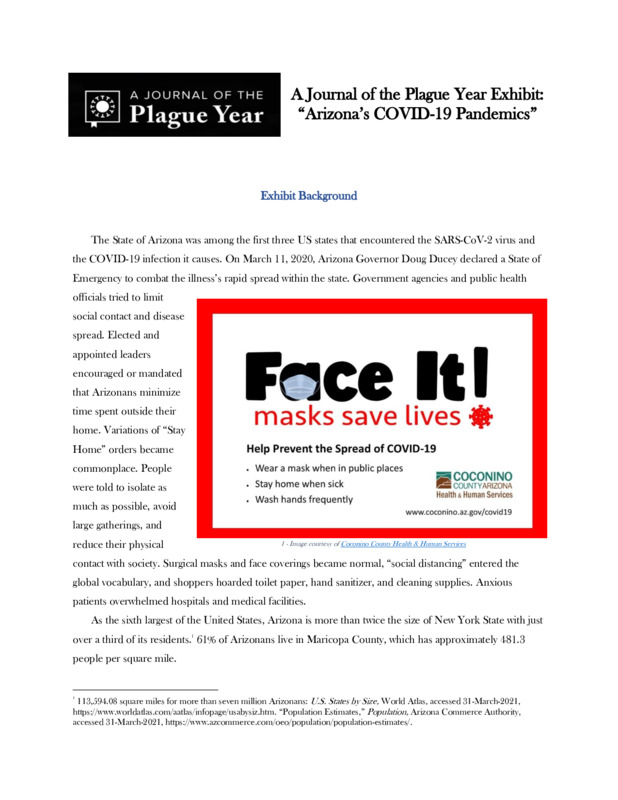 2021-04-20
2021-04-20JOTPY Exhibit: "Arizona's COVID-19 Pandemics" by James Rayroux
While working as a curatorial intern on ASU's 'A Journal of the Plague Year' COVID-19 archive, I created this exhibit on the pandemic experience within the state. In addition to obvious, overarching realities such as socioeconomic status and immediate access to healthcare systems, I initially believed one of the greatest deciding factors that determined one's experience in Arizona was an individual's residence in either predominantly urban or rural environments. The proposed exhibit had been originally titled "A Tale of Two Arizonas" to pay respect to Charles Dickens and the differing realities experienced here. To test my proposed hypothesis, I went about finding data, stories, and submissions that substantiated or disputed my premise. Within a short time, I had identified four distinct environmental drivers of personal pandemic experiences; to me, that indicated the existence of many more I hadn't yet found or had overlooked along the way. My evidence suggested a minimum of four pandemic locales: Urban, Rural, Border, and Tribal within the State of Arizona and its fifteen counties. The recorded health data and personal experiences demonstrated the naivete of my initial hypothesis, and I retitled the exhibit: "Arizona's COVID-19 Pandemics." The Exhibit Background section illustrates the vast dichotomies within Arizona in terms of population density and access to healthcare facilities. Given the virus's respiratory nature, these factors seemed especially relevant to driving diverse local experiences. I chose to include a flyer from the Coconino County Health and Human Services' "Face It! Masks Save Lives" campaign. The flyer included a specific line to "Stay Home When Sick" that seemed to illustrate a different public health paradigm than the broader "stay home" orders from Maricopa and Pima county. This section also features an image of Sedona's red rocks and a portion of The Wave to remind visitors of the wide-open rural areas accessible to all, as well as those with cultural significance to the Native American tribes and limited access to the general public. The next section asks a short, five-question survey in which visitors may participate. The Silver Linings piece features a short audio clip of a father and husband discussing some unexpected benefits of the pandemic. Visitors may explore additional Silver Linings stories and submit their own experience. The Tséhootsooí Medical Center piece seeks to illustrate the different pandemic experience on the state's tribal lands. I hoped to inspire some relevant emotional turmoil for the visitors through the piece's visual presentation. I wanted to create a series of waves with quotes from the medical center's healthcare workers. I hoped visitors' attention would be drawn to the large, bolded key words, and that they would first experience the segments out of sequence because of that. After potentially feeling a sense of chaos, they might settle themselves into a deliberate reading of the texts and find their own order within the experiences provided here. This piece allows further exploration of Native submissions and topics, a review of an additional related news article, and a submission prompt that invites visitors to offer guidance to hospital managers. The next piece illustrates the differences between mask mandates in communities across Arizona. In addition to hearing an audio clip of interviews with mayors and a public health official, visitors can explore additional submissions related to mask mandates and submit their thoughts on statewide mandates. The Arizona Department of Health Services provides zip-code specific infection data on its website, and the wide array of known case infections therein further illustrates potential dichotomies across the state. In working to include and represent this data in a consumable way, I encountered inconsistencies with tribal data. The nation's Indian tribes are overseen by Indian Health Services, a federal public health agency, and it does not collect or report data in the same manner as the State of Arizona or its counties. At first glance, the data would seem to suggest that tribal areas had less severe pandemic experiences than the rural and urban areas, which was not objectively true. I wanted to offer the unedited data to visitors, allow them to drawn their own conclusions, and invite them to offer their thoughts on what potential misunderstandings might emanate from these reporting differences. Visitors may also choose to review the foundational data from this piece, as well. I used the following two sections to offer submission prompts about the visitor's overall pandemic experience as a function of their location, as well as what they might have done if placed in charge of their city, county, or state during this pandemic. A diverse Search section allows visitors to explore additional topics of interest to them. 23 hyperlinks offer pre-defined search parameters. An Advanced Search link allows self-defined research, and a Join The Staff link connects visitors with opportunities to work within the JOTPY archive. A final section asks visitors to provide feedback on the exhibit, its content, and the pandemic in general. Both surveys within the exhibit will display overall results to visitors who participate in them. Through this process, I found incredible amounts and diversity of data outside the archive that spoke to these generally localized experiences, but not that much yet within the archive explained what Arizonans had experienced outside the state's urban environments. I created a call for submissions and delivered it to fifty rural entities that might help support the effort to collect and preserve more rural Arizona stories. Between all the local libraries, historical societies, museums, small-town mayors, and county health officials to whom I asked for help, I am optimistic the archive will better represent all Arizonans in the coming months and years. Despite the exhibit having been created, I ensured its internal search features would include future submissions and allow the exhibit to remain relevant long after its release. -
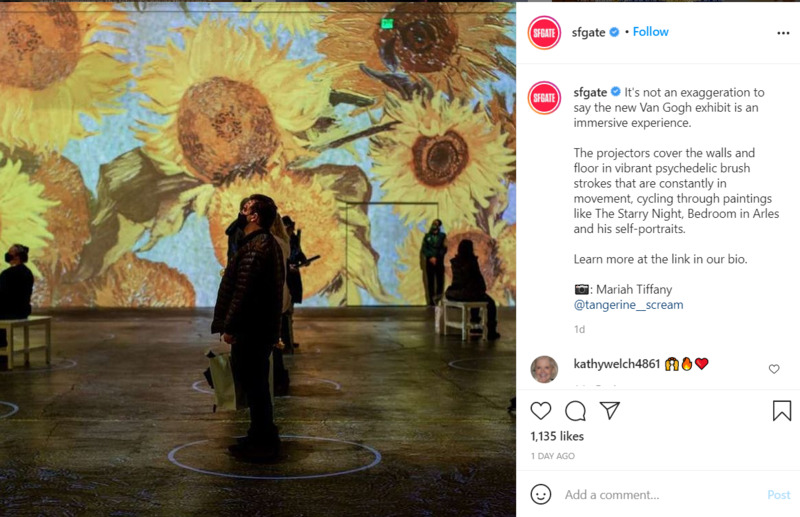 2021-03-20
2021-03-20Van Gogh Exibit
It's not an exaggeration to say the new Van Gogh exhibit is an immersive experience. The projectors cover the walls and floor in vibrant psychedelic brush strokes that are constantly in movement, cycling through paintings like The Starry Night, Bedroom in Arles and his self-portraits. Learn more at the link in our bio. 📷: Mariah Tiffany @tangerine__scream -
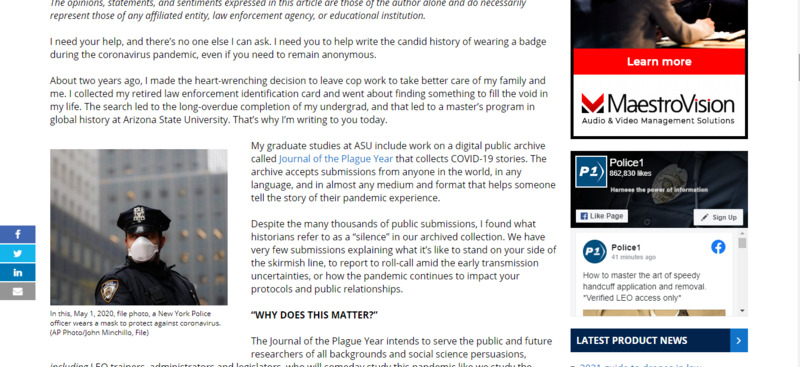 2021-03-09
2021-03-09Police1 Promotes Law Enforcement Submissions to the JOTPY COVID-19 Archive
I wrote this article for Police1 to promote law enforcement submissions to the JOTPY COVID-19 archive. At the time of this publication, Police1 enjoys approximately three million unique visits per month to its website. The site published my article on 03/09/2021, and I intend to use this article to encourage further promotion of the archive's Law Enforcement collection. -
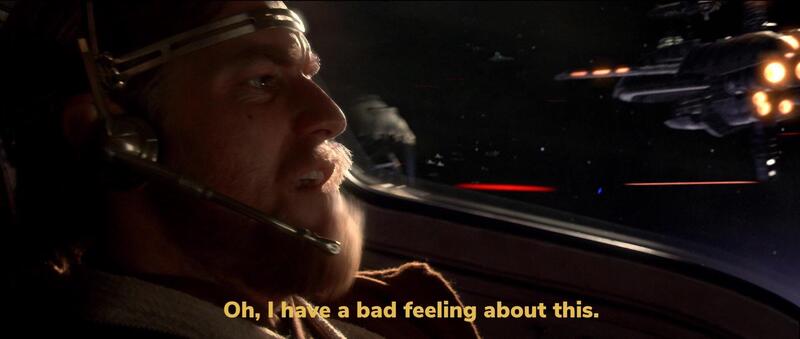 2020-12-18
2020-12-18I have a bad felling about this
My experience of 2020 has been a little different it all started when me and my friend were hanging out then his mom told us that we won't be going to school for two weeks we were excited but we did not know what we were saying because we did not go back to school for almost like 5 months that resulted to E learning -
2020-12-14
Thanksgiving 2020
The Thanksgiving that I had in 2020 was in some ways different, and some ways the same. I would normally go to my Grandparents house, and they would invite family and friends over too. But this year, only my family was invited. My grandfather had also passed away in October, so only my grandmother was there. The food was the same, but the company was very different. It felt more lonely this year, because of the lockdown. My Thanksgiving was different in some ways, but familiar in other ways. Overall, it was a fine experience, but obviously not as good as previous years. -
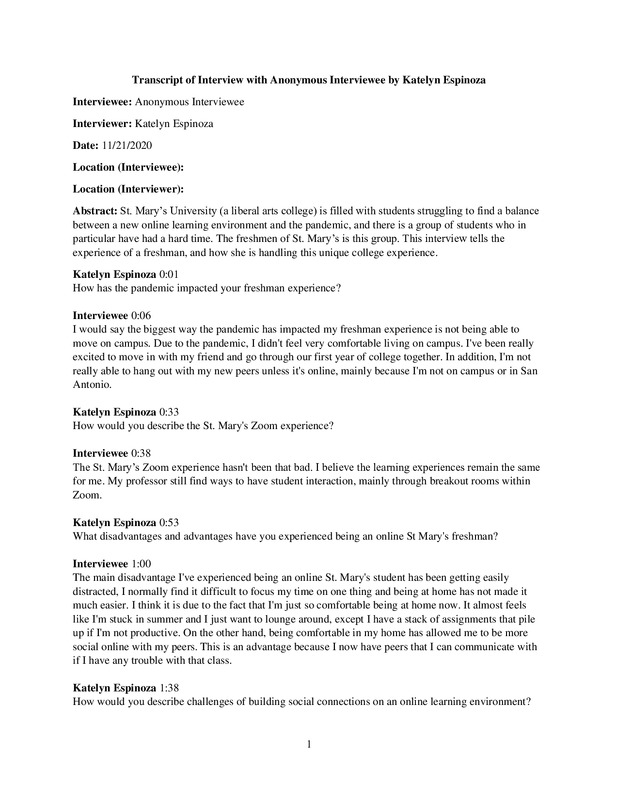 11/21/2020
11/21/2020Anonymous Oral History, 2020/11/21
St. Mary’s University (a liberal arts college) is filled with students struggling to find a balance between a new online learning environment and the pandemic, and there is a group of students who in particular have had a hard time. The freshmen of St. Mary’s is this group. This interview tells the experience of a freshman, and how she is handling this unique college experience. -
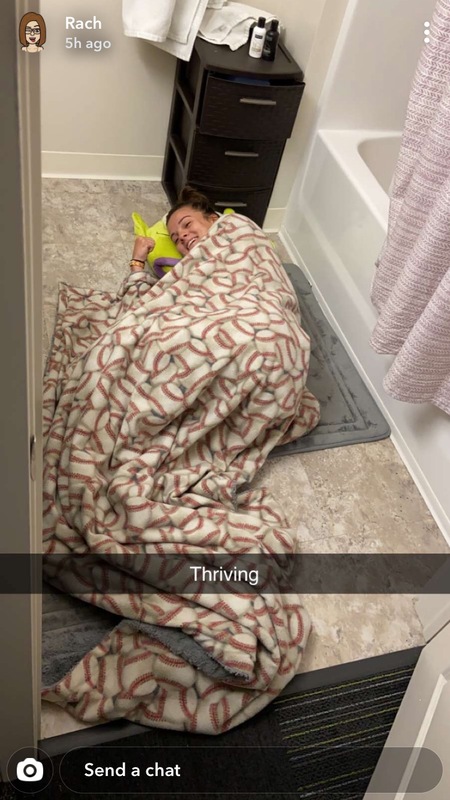 2020-08-15
2020-08-15Jess with Covid
It shows that COVID is real and that it is serious. My roommate was infected with the virus and she got really sick. In the picture she was on the bathroom floor and this is because she was very nauseous and if she wasn't in the bathroom, the whole apartment would've been a mess. We checked up on her constantly to ensure she was okay and we would cook for her. She had to quarantine in her room for 2 weeks since she moved in before us so we didn't have to quarantine as long as her but it was still not a fun time. She is seen smiling in the picture but that is just because we tried to lift up her spirits so she wasn't miserable the entire illness. -
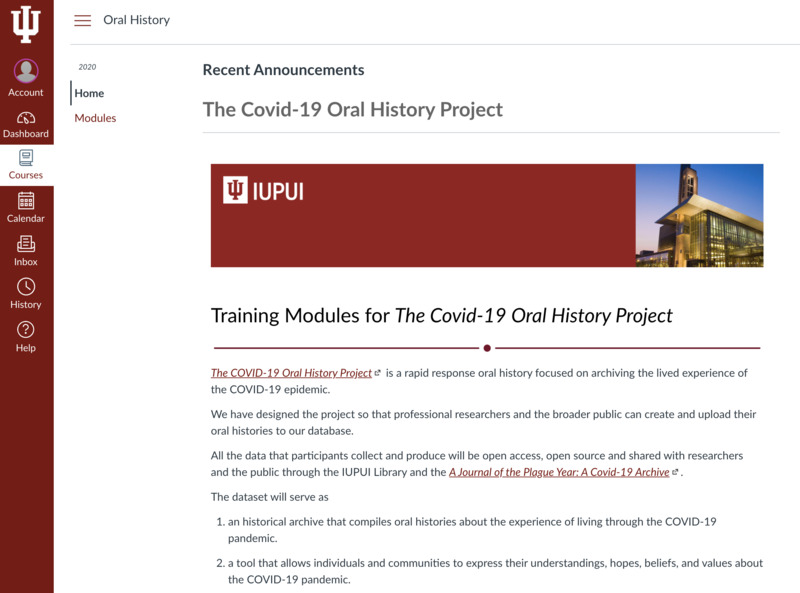 2020-07-16
2020-07-16Training Modules for The Covid-19 Oral History Project
This training module was designed for individuals who want to participate in conducting oral histories for The Covid-19 Oral History Project and JOTPY. -
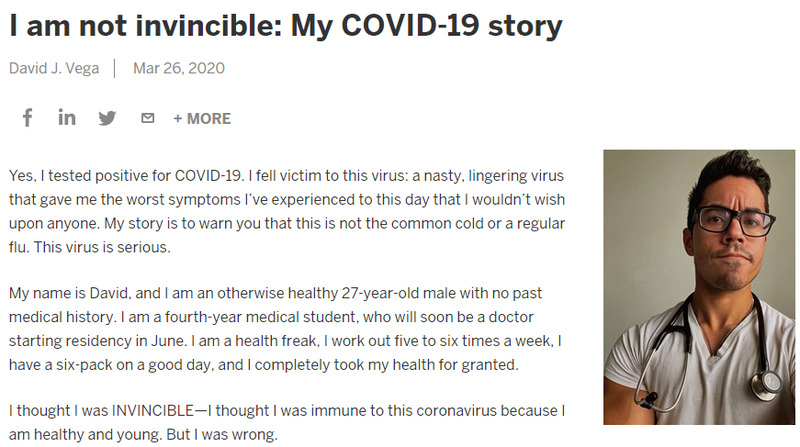 2020-03-26
2020-03-26Medical Student's Experience with COVID-19
This is a blog post from a fourth year medical student at Indiana University’s School of Medicine. According to the article, he had taken the precautions he thought were necessary in order to remain COVID free, but it really isn’t certain that no matter all the precautions you take that you won’t get it. It addresses the thoughts that younger citizens are less likely to contract the virus, and don’t expect it to happen to them. It pleads for people to be vigilant in their measures to remain COVID-free and to understand that it is a very real possibility. The author also discusses the dangers of the virus also presenting no symptoms in some who have contracted it. (Arizona State University, HST485) -
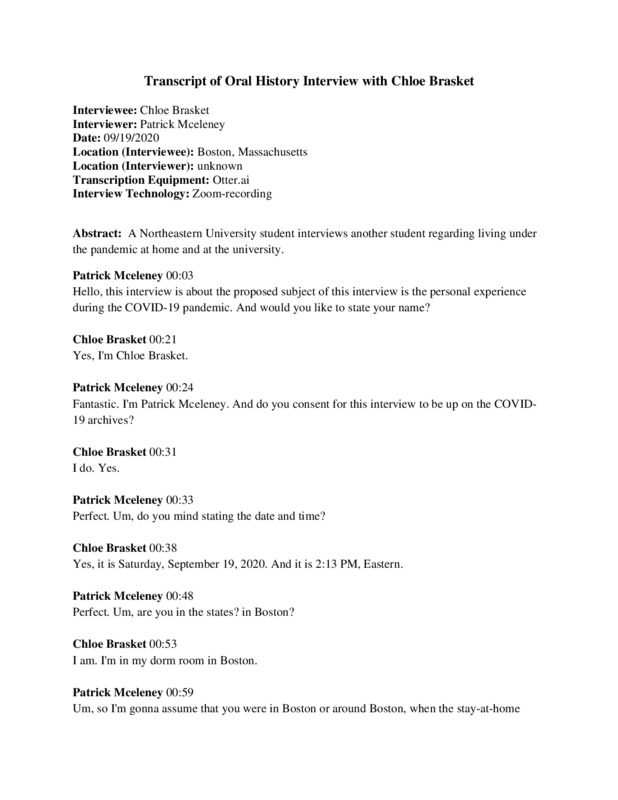 09/19/2020
09/19/2020Chloe Brasket Oral History, 2020/09/19
Documenting personal experience during the Covid-19 pandemic. A Northeastern University student interviews another student regarding living under the pandemic at home and at the university. -
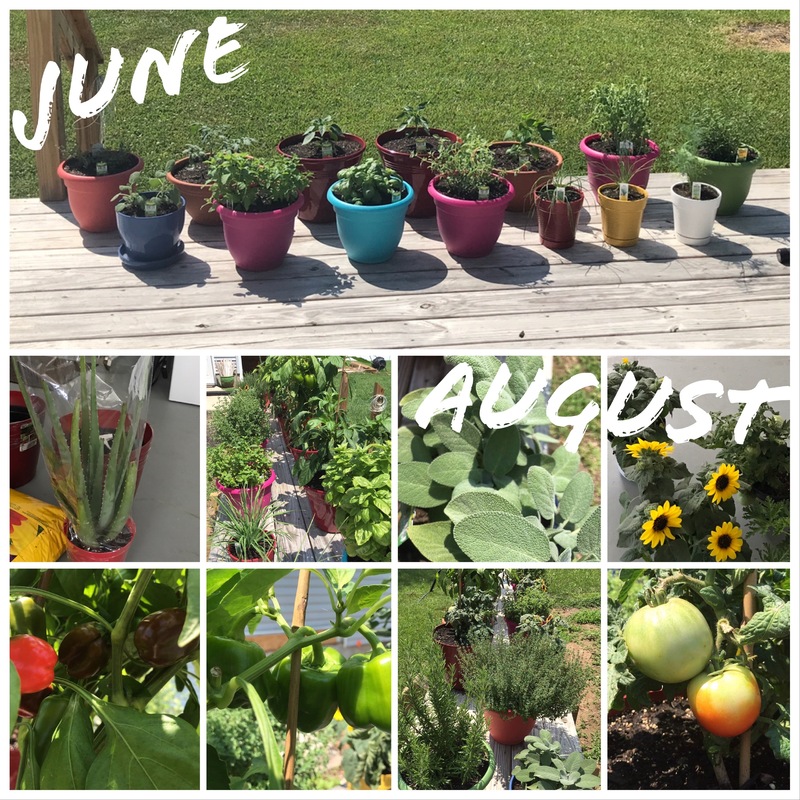 2020-08-10
2020-08-10Growth, Gratitude, and Green Babies
Teddy Roosevelt said, "The more you know about the past, the better prepared you are for the future." As the pandemic and panic seemed to spread wildly across the globe, I found myself turning to my relatives for answers and advice. When specifically in their lifetime did they remember a time of uncertainty? What did they do to maintain a sense of direction, clarity to make decisions, a sense of well being and safety when each day's events are unfathomable? My mother responded with stories of her mother. My grandmother has always been the most resourceful person I know. Growing up in the Great Depression planted seeds of ingenuity and self sufficiency in her, which she continued to cultivate along with priceless experience and knowledge. She recalled people taking responsibility for their situations and security, and doing their best to make the most of what they had, which at the time wasn't much at all. I will never understand the scarcity she faced in that era, but I did experience the eerie alarm that washed over my fiancé and I entering a nearly empty produce section of our local grocery store, then another store, then another store. Almost every store in our small town of Lewes, Delaware had been almost completely panic-bought out of produce, meat, cleaning products, and hygiene products. It was at that time we decided to take a life lesson from Grandma, gain some grit, and get our hands dirty. Early June, we began a basic herb garden to get the hang of being "new parents to green babies" as we expressed it to our friends and family. We soon adopted a couple of tomato plants, bell peppers, red lunchbox sweet peppers, and as of recently, sunflowers. August brought our efforts to fruition when tiny peppers and tomatoes started to develop and today we plucked our first ready to eat hamburger tomato along with a few green bell peppers and scarlet red sweet peppers. Tending our garden has grown more than just invigorating herbs and veggies, but it has cultivated therapeutic peacefulness and tranquility while watering, cleaning, and caring for these little forms of life. We learned first hand the valuable lesson of just how giving and selfless nature is, ex. planting one seed and getting three pieces of fruit in return from that one plant, or planting one bulb which springs forth four blossoms. Giving life and helping maintain that life in something smaller than you grows a beautiful relationship between humanity and nature, a relationship which has become more and more distant. Growing a garden reconnected us to the knowledge, innovation, and self reliance, of our grandparents. It reconnected us to getting outdoors, getting our hands dirty, and getting into a flow state of mental clarity and caring for another living being apart from human kind. It reconnected us to nature, to the valuable lesson Mother Nature can teach us about selflessly giving and sharing, and a reminder of the respect she so deserves and is so lacking in the current state of the environment. I hope our story of our little backyard garden will encourage you to plant seeds of your own, to look to the priceless knowledge and experience of your relatives for advice in facing an uncertain future, and to share your lessons and stories of how COVID-19 impacted your life as well. -
2020-07-11T02:53
Isn’t it strange?
Through this pandemic, we were tested as a society on how strong our morals, values, and beliefs are. We were exposed to how fragile our ideals are and how far we truely are from a perfect world.
